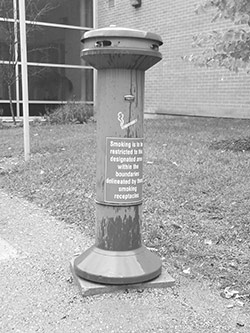What exactly is in the butt?
 CREDIT: AMANDA RICHMAN
CREDIT: AMANDA RICHMANOne of the many cigarette butt receptacles that are scattered through campus.
Amanda Richman is sustainability co-ordinator for Fanshawe College.
Cigarette butt litter is a global problem. With an estimated 4.5 trillion butts – or about 1.7 billion pounds – being tossed on the ground every year. Not only is this an eye sore, but it also has many detrimental effects on the environment.
Cigarette butts decompose slowly and also contain toxic substances. It is a common belief that filters are made of cotton, but this is untrue. Butts are made of cellulose acetate, which is a synthetic fibre that resists degradation. It can take up to 25 years for a single butt to decompose. Since it is a synthetic material, it never truly goes away but rather breaks down into smaller plastic parts or powder.
Multiple chemicals become trapped in filters when cigarettes are smoked. Carcinogens, such as benzopyrene and formaldehyde; poisons, such as arsenic, lead, acetone, toluene, cadmium, nicotine and benzene; and hazardous chemicals, such as butane and ammonia, can all be found in a single butt. Considering the vast amount of butts littered every year, the amount of toxic chemicals can add up.
When someone flicks his/her butt to the ground instead of putting it in a proper receptacle, all the chemicals above leach into soil, ground water, streams, and rivers and become ingested by wildlife. They are washed from the streets into storm sewers, into rivers and finally into the ocean. In fact, cigarette butts are the most prevalent type of debris collected in beach clean-ups around the world.
It’s not just the environment that’s cause for concern. Cigarette butts are also found in areas where children play, like parks where they can be ingested.
Cleaning up butts is also very costly. Additional sidewalk and street sweeping, park maintenance, storms drain cleaning and increased maintenance of storm drain filters can all lead to higher taxes being paid in cities. Business owners also have to pick up the tab for cleaning up butts around doorways, sidewalks and parking lots.
At Fanshawe College, we are no strangers to the plague of cigarette butt litter. They cover the grounds and gardens at every designated smoking area, despite the fact that all these stations have many receptacles available. It is amazing that people who would not normally litter do not give a second thought to flicking their butt onto the ground.
There are 14 designated smoking locations on campus with butt receptacles. It is best to make use of these areas because the college is a smoke-free environment and you can be fined $25 for littering and up to $75 for smoking outside of a designated area. By using these areas, you can also be guaranteed a safe way to dispose of your cigarette butt.
So next time you are out on campus for a smoke, please take care to use the receptacles at the designated smoking areas to butt out. If you are at home, try putting some soil or sand in a can and use that to butt out. Once it is full, you can put it in the garbage, where it will be less likely to pollute water resources.
Let’s make the planet a little healthier, one butt at a time.
For more information on cigarette butt litter and why it matters, visit tinyurl.com/7thhs9l.
For more detail on Fanshawe’s smoking regulations and designated smoking areas at our regional campuses, visit tinyurl.com/mywtj2h.













